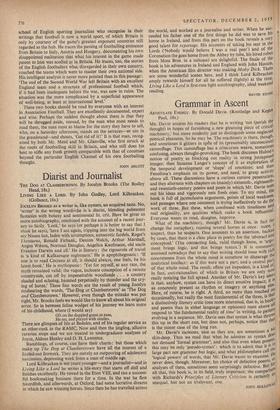Diarist and Journalist
THE Doo AT CLAMBERCROWN. By Jocelyn Brooke. (The Bodley Head, 18s.) LIVING LIKE A LORD. By John Godley, Lord Kilbracken. (Gollancz, 16s.) JOCELYN BROOKE as a writer is, like oysters, an acquired taste. No, 'writer' is the wrong word—he is a diarist, blending pubescent fantasies with botany and sentimental lit. et*. Here he gives us more autobiography, combined with the account of a recent jour- ney to Sicily. 'Look,' he says (or perhaps it is better to say that I think he says), 'here I am again, tripping into the big world from my Nissen hut, laden with scrumptious, autoerotic fardels, Roget's
hesaurus, Ronald Firbank, Denton Welch, Arthur Marshall, Angus Wilson, Norman Douglas, Angelica Kaufmann, old uncle Erasmus Darwin and all.' He is literary : the rigmarole of travel is 'a kind of Kafkaesque nightmare.' He is apophthegmatic : 'If one is to read Cocteau at all, it should always, one feels, be his latest book.' He is mythopoeic : 'Yet for myself, at any rate, the myth remained valid; the vague, inchoate conception of a remote countryside, cut off by impenetrable woodlands . . . a country shaded and echoing, haunted perpetually by thunder and the cry- ing of horns.' These fine words are the result of young Jocelyn mishearing the words, 'The Dog at Clambercrown' as 'The Dog and Clambercrown.' However, even though the mistake was put right, Mr. Brooke feels we would like to know all about his original error. So in between feline wodged of his journey we learn more of his childhood, where (1 would say) Oft on the dappled green at ease,
He sat. and played with similes.
There are glimpses of life at Bedales, and of his regular service as an other-rank in the RAMC. Now and then the jingling, allusive caravan stops and we are treated to undergraduate analyses of Joyce, Aldous Huxley and D. H. Lawrence.
Ramblings, of course, can have their charm: but those which make up The Dog at Clambercrown have all the interest of a fizzled-out firework. They are merely an outpouring of adolescent narcissism, depressing work from a man of middle age.
Lord Kilbracken is ten years younger—and a journalist—and in Living Like a Lord he writes a life-story that starts off dull and finishes excellently. He rowed in the Eton VIII, and ran a success- ful bookmaking business there for a time. In the war he flew Swordfish, and afterwards, at Oxford, had some lucrative dreams in which he saw winning horses. Since then he has travelled across
the world, and worked as a journalist and writer. When he sue• ceeded his father one of the first things he did was to save his home in Ireland, and from this part on the book reveals a very good talent for reportage. His accounts of taking his seat in the Lords (Nobody would believe I was a real peer') and of the Coronation (he goes home from the Abbey by tube, his hired robes from Moss Bros. in a suitcase) are delightful. The finale of the book is his adventures in Ireland and England with John Huston, when the American film director was making Moby Dick. There are some wonderful scenes here, and I think Lord Kilbracken amply rewards himself for all he suffered (lightly) at the time. Living Like a Lord is first-rate light autobiography, ideal weekend reading.
DAVID STONE


































 Previous page
Previous page